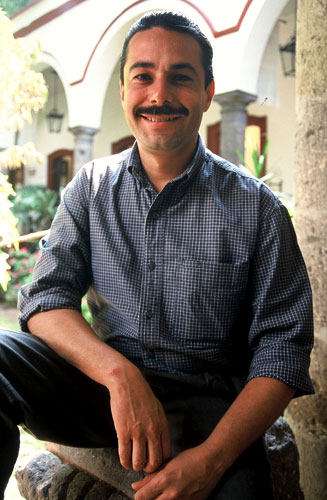Beautiful platter
Bright and cheerful in my dining room. Perfect for informal gatherings.


✓ Item added to cart
View Cart
Expert in the legendary art of Talavera ceramics, Alonso Luis creates the innovative design of this platter with scalloped borders. Centered by a florid mosaic, the enameled plate is painted by hand with a palette of blues, green, yellow, and brown.

Artisan Organization: Alonso Luis
Country: Mexico
Latest Update
"I have been working with Novica for some years now, since 2000.
"Since 1989, I've worked in the Talavera technique, which I learned from a young age. But I didn't stop there — I want each one of my ceramic designs to have meaning and history. Because of this, I worked hard to learn the most about it that I could in order to achieve beautiful and quality pieces.
"You have given me the opportunity to expand my creativity and talent, and this has been reflected in my sales. This makes me feel very proud and content. Your support has also meant a lot for each of the families who work with us.
"We continue working with the same technique yet have been able to give achieve a unique style that honors Puebla's traditional Talavera ceramics. This led us to make necessary changes in each one of our designs, but with better quality and more passion in the creative process.
"Our objective has always been to distribute our work across international borders, with that touch that characterizes us as a Mexican town. Thanks to our constant work, we have received many honorable mentions. We have expanded our collection to give you all kinds of options in bringing this beautiful tradition to every corner of your homes.
"We have been given the wonderful opportunity to create a line of jewelry with the essence of Talavera. These beautiful designs have opened doors and a new market for us.
" Quality is our primary focus. It embodies what we are, and we're tremendously proud to offer ceramics that are made entirely by skilled Mexican hands."
Original Artisan Story
"Hello, my name is Alonso Luis. I come from Puebla and create traditional majolica ceramics in the Talavera style. I began this work in 1989 because of the excitement I felt when crafting such ceramics – traditional, yet free of lead.
"Our work is completely carried out in the traditional way, the way its been done here for hundreds of years. The clay is acquired raw. It's a virgin material that comes directly from mines called barriales and hasn't undergone any kind of industrial alteration. We try to make a good selection from the best types of clay, since this is the first factor in the quality of our work.
"When clay of satisfactory quality has been selected, it is cleaned and prepared until a material of smooth plasticity is achieved. When it is easily malleable, it goes to the potter's wheel. The pieces are shaped, then dried – a very delicate process. Finally, they enter the kiln for the first time, at a temperature of 1050°C for 15 minutes. After this stage, the piece is known as 'bisque,' or 'greenware.'
"For the next step, we permit the piece to cool thoroughly, then submerge it in the glaze. It is then sent to be decorated, and our artisans draw exclusive motifs freehand on the bisque. Colors are applied, and the piece is fired once more to achieve a glassy finish.
"I'm a person concerned about the environment – its conservation and its rescue. This is reflected in our ceramics, as everything we make is lead-free.
Another characteristic of my work is that my ceramics can be used in the microwave oven. However they are not designed for use at high temperatures, therefore they should never be used on the stove or in a conventional oven.
"Our ceramics are resistant and we have a wide variety of designs. All of them bear two fundamental characteristics – originality and the tradition known as Talavera from Puebla."
Talavera is a distinctive art form brought to Mexico by artisans from Talavera de la Reina, Spain, already influenced by Moorish designs. The artisans of Puebla then incorporated Chinese designs, thus creating the blue and oyster-white patterns traditionally associated with Talavera. Today one may appreciate contemporary designs that include yellow, green, and red.
National and international conventions require that a rigorous procedure be followed in the elaboration of authentic Talavera products. A trademark is the fact that each individual item will be slightly different."
Long Handled Tasting Spoon - Tasty Trio - Set of 3
Member:$21.60 Guest: $27